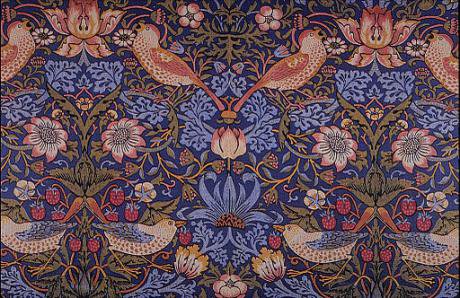
William Morris printed textile, Strawberry thief, 1883. Wikicommons. Public domain.It is said that the Brexiteers have the identity side of the debate sown up. The British, or at least the English, do not feel European. We have our history as a proud, island people - they, on the Continent, have very different traditions. It is remarkable how this myth has taken root, although the English, Scots, Welsh and Northern Irish so obviously share common linguistic, cultural and indeed political roots with other Europeans, and when the whole recorded history of our islands has been so bound up with the Continent. It is particularly outrageous since so many British people have given their lives over the last century, not so that we can retreat into Little England but so that Europe can be free and democratic.
Britain’s post-imperial delusions have been the main reason for blindness to this history. When the Common Market was first proposed, many on the left not only saw it as a capitalist club, but believed that Great Britain remained powerful enough to stand alone as a social democracy, or at least that the renovated Commonwealth could provide sufficient international support. The French president of the European Commission, Jacques Delors, is generally credited with puncturing these illusions (which Thatcherism had already undermined) with his speech to the Trades Union Congress in 1988. However the ground had really been broken by the remarkable movement for European Nuclear Disarmament (END) which was launched in 1980, and above all in the speeches and writings of E.P. Thompson.
Edward Thompson was the great historian of the English working class and of those quintessentially English radical thinkers, William Morris and William Blake. He had famous spats with compatriots whom he saw as insufficiently attentive to ‘the peculiarities of the English’, and with a French philosopher whose grand theory seemed, to him, insufficiently grounded in the very English medium of empirical reality. And yet his political passion as a leader of END was not just to end the Cold War, or to remove nuclear weapons, but to unify Europe. Indeed he saw European unity, achieved through popular movements from below as well as through agreement between states, as the key to peace and disarmament.
Unlike some younger disarmers, Edward saw a direct link between Europe’s armed liberation from fascism in 1944-45 and the peaceful liberation from the Cold War blocs which END proposed. The first liberation was very personal to him, and not only because at the age of 20 he had fought through the Italian peninsula in the last year of the world war (he had very mixed feelings about the military experience, explored in his moving essay,‘The LIberation of Perugia’). More importantly, his elder brother Frank had been executed while fighting with Bulgarian resistance fighters in 1944, giving his life, as Edward saw it, for a free and democratic Europe.
In the early 1980s, Britons like other Europeans faced another existential threat, compared to which the worst failures of today’s EU bureaucracy pale into insignificance. ‘We Europeans are packed into this small continent,’ Edward noted, while the Warsaw Pact and NATO targeted multiple nuclear warheads at each and every city. (Some of the atmosphere of the time was conveyed in the recent TV drama, Deutschland 83.) Starting from a British base, Edward and his comrades pursued a single-minded strategy not just of linking the burgeoning West European peace movements with each other, but also of engaging these movements with the pressure for democracy in Eastern Europe. This goal set END apart from those in CND who saw removing nuclear weapons as the ultimate goal, and put it on a collision course with Stalinists who objected only to western nuclear systems.
It was a visionary strategy, set out in Thompson’s 1981 lecture, Beyond the Cold War. When first proposed, there were millions protesting NATO missiles on the streets of West European capitals, but apart from Solidarity in Poland (primarily a free trade union, and crushed by a military coup in late 1981), Eastern Europe had only small numbers of open dissidents. Many of them were suspicious of western peaceniks. Yet the end of the 1980s saw millions on the streets of Eastern European capitals, calling for democracy and bringing an end to the division of Europe in essentially the way that Edward and END foresaw. It helped, of course, that Mikhail Gorbachev had come to power in the Soviet Union, and that he and Ronald Reagan began a rapprochement that was unimagineable in 1981, but both of these developments were partly enabled by the peace movements.
After the dramatic revolutions of 1989, not even Margaret Thatcher, and certainly not the British Labour Party, could withstand the European tide. The new Europe had many flaws – new nationalist parties replaced civil society movements in the east, the west helped foist privatisation on the former Communist countries, NATO expanded and increasingly alienated Russia, and a currency bloc was launched which could not withstand the full-blown financial crisis which spread from the United States in 2008. But in the 1990s and early 2000s, the European idea was strong. The German and French governments even stood out against George W. Bush’s catastrophic invasion of Iraq in 2003.
Edward Thompson died in 1993, much exercised by the terrible new wars in the Balkans. The new Europe he envisaged was certainly much more than the EU of the national leaders and bureaucrats, of whose limitations Yugoslavia was an early indication. But their EU expansion was only possible because of how the popular movements ended the Cold War, very much as he had hoped and foreseen.
Doubtless Thompson, if he were alive today, would rail against the shameful failure of the EU to live up to its obligations to refugees and the vindictive policies of the Eurozone towards Greece. I am sure he would excoriate David Cameron for his abdication of Britain’s responsibility for Europe’s refugees, and I can imagine a withering dissection of the Prime Minister’s ‘renegotiation’ of migrant workers’ rights.
But Thompson’s vision leaves no room for Britain’s turning away from Europe to a fantasy mid-Atlantic or neo-Commonwealth position of the kind floated, typically unseriously, by Boris Johnson and Michael Gove. The slogan of the progressive pro-EU campaign group, Another Europe is Possible, sums up what Edward was saying in the 1980s in his campaign against the Cold War division of the continent. We have to remain part of the European Union to make a better kind of Europe possible.
Read more
Get our weekly email

Comments
We encourage anyone to comment, please consult the oD commenting guidelines if you have any questions.